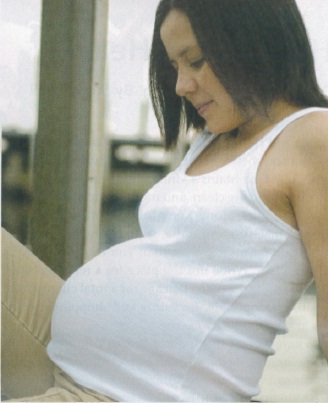by Emily Downey
I gave birth to my daughter two years ago in Tokyo, and I wouldn’t want to have a child anywhere else in the world. There are several reasons for this. For a start, Japan has the highest live birth rate in the world, meaning that more babies are born alive and healthy than in any other country. Then, there’s the fact that regular prenatal check-ups are always scheduled with an ultrasound, whereas in most western countries they are only done twice. There’s also the high standard of nursing care, combined with the post-birth hospital stay of five days to two weeks, which far exceeds the stays that are the norm in most western countries. All this and more makes Tokyo a great, exotic, although maybe unexpected place to have a baby.
The above sentiments were echoed by several foreign women who are either pregnant or have already had children in Tokyo. Ushka Wakelin, a New Zealander mother said, “I wouldn’t have a baby anywhere else, and speaking to friends from home only confirms what a great experience I had here.” Taya Michalski, an Australian woman who is 36 weeks pregnant, goes on to state, “I feel I have more support here in Tokyo than I would have if I was back home.”
The Tokyo Pregnancy Group, a fantastic organization run by pregnant women living in Tokyo, is the one-stop resource and support group for English-speaking women. The group meets every two weeks at a different member’s house. There is always a featured speaker, ranging from breastfeeding consultants to English-speaking doctors who come along and give free lectures. It is an invaluable resource for any pregnant woman in Tokyo. “Being pregnant for the first time and living in Asia, it is a more than helpful and comforting organization,” says Andrea Grahe, a German woman who is 26 weeks pregnant.
When it comes to hospitals and doctors, there are a number of good options. The three main hospitals are Seibo Catholic Hospital in the northern Tokyo suburb of Mejiro, Aiiku Hospital in the expat enclave of Hiroo, and the ritzy Sanno in Akasaka with a grand piano in the foyer. All are private hospitals and have English-speaking nurses and doctors, well-appointed, hotel-suite-like private rooms, and a very good reputation amongst Japanese and foreigners alike. There are a number of other birthing options for those who don’t want to go the traditional hospital route. For a good overview, see the pregnancy section in Being A Broad in Japan, published by Alexandra Press.
As for doctors, Hideki Sakamoto MD is a standout. “Dr. Sakamoto was recommended by a friend and was the only English-speaking obstetrician I had heard of at the time, but there are others,” says Taya. It may pay to visit more than one doctor in the early stages to see who will be best for you. Again, with a bit of research and talking to others at the pregnancy group, you will discover a world of options.
Prior to the birth, it is a good idea to take a birthing class, which is generally a two-day course covering topics such as how to recognize when you are in labor, when to go to the hospital, and relaxation and preparation techniques, to name a few. Brett Iimura, an American Certified Childbirth Educator with two children gives excellent intensive classes in English on a regular basis (see her profile on the page opposite).
Another good way to prepare for a new baby is to become a member of the breastfeeding advocacy and support group La Leche League, which has a chapter that meets regularly in Tokyo. LLL are instrumental in helping nursing mothers, and it is a good idea to join prior to giving birth, as it is a great way to meet other new mothers or mothers-to-be. “The friendships one makes are vital as most foreign women in Tokyo do not have extended family available for support,” explains Ushka.
Finally, in the words of Michelle Gannon, an American woman who has recently had a baby boy, “While I am not interested in giving birth again any time soon, it is tempting, only because I would love to give birth here again!”
Resources
Brett limura Childbirth Education Center (CEC)
www.birthinjapan.com
Tel/Fax 03-3414-7458
Email: [email protected]
Sanno Hospital
www.sannoclc.or.jp
Tel. 03-3402-2187 (operators speak English)
Fax: 03-3404-3652
8-10-16 Akasaka, Minato-ku, Tokyo 107-0052
Seibo International Catholic Hospital (Seiho Byoin)
www.seibokai.or.jp
Tel. 03-3951-1111, Fax: 03-3954-7091
2-5-1 Nakaochiai, Shinjuku-ku, Tokyo 161-8521
La Leche
www.lalecheleague.org/Tokyo.html
Beckie Tel. 03-3394-4359
Vicki Tel. 03-3479-9812
Email: [email protected], [email protected], [email protected]
Aiiku Hospital
www.aiikii.ml
Tel. 03-3473-8321, Fax: 03-3473-8406
5-6-8 Minami Azabu, Minato-ku, Tokyo 106-0047
Tokyo Medical & Surgical Clinic
www.tmsc.jp
Tel. 03-3436-3028, Fax: 03-3436-5024
No. 32 Mori Bldg. 2F, 3-4-30 Shiba Koen, Minato-ku,Tokyo 105-0011
Dr. C. Bliah [GYN]
Dr. Hideki Sakamoto [OB/GYN]









